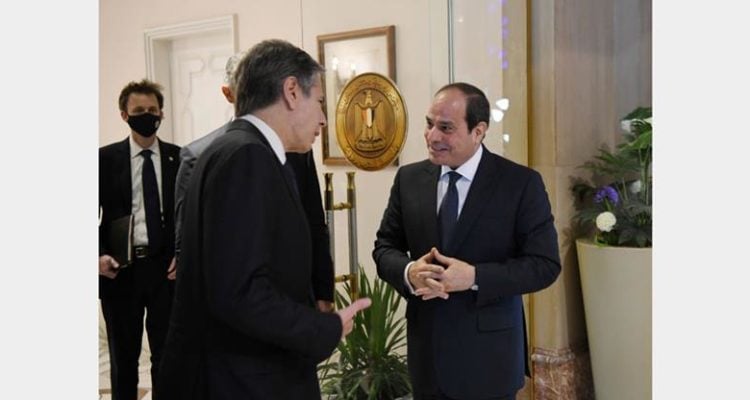Most of the holdup in a potential hostage deal allegedly centers around control of the Gaza-Egypt border, which has been Hamas’ weapons pipeline and is now in Israel’s hands.
By Batya Jerenberg, World Israel News
U.S. Secretary of State Antony Blinken is coming to Egypt Tuesday to hold discussions on the one of the main issues holding up a hostage deal with Hamas – control over the Philadelphi Corridor, The Wall Street Journal reported Monday.
Citing “an official in the region,” the report said that Blinken’s trip is being made “to reassure Israel over its concerns that Hamas can smuggle weapons across” the Egyptian-Gazan border, which the IDF and Prime Minister Benjamin Netanyahu have called Hamas’ oxygen pipeline in terms of military resupply.
Since taking the Corridor over several months ago, the Israeli army has discovered – and blown up – dozens of smuggling tunnels running from the Egyptian side into the Gazan city of Rafah, some large enough for trucks that can carry missiles as well as tons of cement for terror tunnel construction.
Netanyahu has declared that Israel must control this nine-mile-long line or else Hamas will easily rearm, rebuild, and become a new “existential” threat to the Jewish state within a few years’ time. Most of the Israeli public agrees that holding the Corridor is of utmost importance to Israel’s security.
Hamas refuses to sign off on a hostages-for-ceasefire-and-prisoners agreement unless the IDF withdraws, both from the southern line and the Netzarim Corridor that the army built in central Gaza that stretches to the Mediterranean Sea in order to cut the Strip in half.
Although Cairo is considered by the U.S. to be a faithful mediator in the hostage talks, it has sided with Hamas in strenuously opposing an Israeli presence on its border with Gaza.
Egypt has not acknowledged its total failure to prevent the wholesale Palestinian smuggling that is considered the main reason Hamas could become a major and immediate security threat to Israel, as it proved on October 7, when the terrorist organization led an invasion in which they and other Gazans massacred 1,200 people, the vast majority of them civilians.
The paper pointed out that Blinken’s visit follows last week’s announcement that the U.S. would be providing Egypt with its full annual military aid package of $1.3 billion, overruling a Congressional directive that conditioned some of the funding on Cairo improving its human rights record, which is still considered deplorable by experts in the field.
A State Department spokesperson said that the decision to restore the last $320 million of the package was “important to advancing regional peace and Egypt’s specific and ongoing contributions to U.S. national security priorities, particularly to finalize a ceasefire agreement for Gaza” and help end the Israel-Hamas war.
It is unknown whether Blinken will tie the Americans’ generosity to a request that Egypt soften its stance on the Philadelphi Corridor and persuade Hamas to do so as well, in order to get a deal done that will see the release of at least some of the live hostages still remaining in Hamas captivity over 11 months after they were abducted.
President Joe Biden has repeatedly stated that freeing the hostages remains one of his top priorities.
The ceasefire that would be part of the deal would also seemingly stop a possible Israel-Hezbollah war, as the Lebanese Shiite terrorists have said they would stop their constant rocket attacks on Israel if the fighting stops in Gaza.
Jerusalem has made increasingly threatening noises in recent days to restore quiet in its northern region by invading Lebanon to push Hezbollah away from the border, as 60,000 Israelis are still evacuated from their homes for their safety, an untenable position for any government.
Blinken’s trip to Cairo is in accord with the U.S. position that diplomatic means can prevent such a war, which it fears could turn into a wider, regional conflict that includes Hezbollah’s master, Iran.





